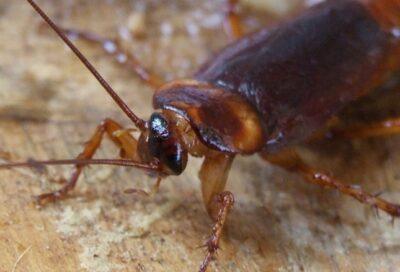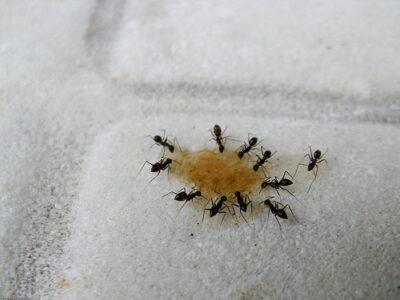
Image source: patriotpestfl
The moist, warmer temperatures of spring lead to buds on our trees and flowers in our gardens, but they can also lead to some not-so-pleasant visitors in our homes.
No matter how good we are at housekeeping or how vigilant we are in keeping our doors and windows closed, insects and bugs seem to find new and ingenious ways to infiltrate our houses this time of year.
If you have a bug problem but cringe at the idea of spraying insecticides in your living space, there are a wide variety of natural options for you to consider. Some of these ideas use foods or other ingredients you already have on hand and are surprisingly easy and effective. Others involve a little preparation, but are safer alternatives to toxic store-bought sprays.
Flies
I don’t know about you, but a pesky fly buzzing around my home drives me nuts. Did you know that flies hate the smell of basil and mint? They do, and you can keep flies at bay by strategically placing pots of basil or mint near windows and doors or in your eating area. If you lack sunlight or space for a live plant in those locations, you can try placing small pouches of the herbs in areas where flies gather, such as near pet food bowls, for example. Another natural fly repellent is eucalyptus oil. Try placing a few drops on a cotton ball and leaving it in a small bowl on a windowsill.
Moths
You may already know about the effectiveness of cedar in deterring moths. A bag of cedar chips or drops of cedar oil on an absorbent cloth will repel the winged creatures.
Another option you may not have heard of is to use dried lemon peels for moth control. Wrap dried lemon peel in cheesecloth and hang the pouch in your closet or anywhere moths are a problem.
Spiders
You can mix together an effective spider spray with water and unsweetened lemon or lime juice. Spray the solution on doorways and windowsills to deter spiders. Another option is to dab some orange oil around doors or windows. Spiders hate it.
Ants

Image source: kitchenstewardship
If you have an annoying ant invasion here are a couple of natural remedies:
- Mix a 50/50 solution of vinegar and water in a spray bottle to wipe down ant surfaces where you have spotted ants. The vinegar destroys the scent the ants use to find their way into your home.
- Ants have an aversion to cucumber. Place cucumber peels or slices where you have seen them.
- Try leaving mint leaves or mint teabags where ants have appeared.
- Sprinkle whole cloves inside or under cabinets where you have seen ants.
- Leave a few fresh cloves of garlic in a dish where you have noticed ants. Replace daily.
Roaches
Your cat may love it, but roaches hate catnip. You can either leave small cloth bags filled with catnip in areas where roaches are a problem or you can create a solution to spray around your baseboards or in cabinets by boiling some catnip in a cup of water. Catnip (nepeta cataria) is a short-lived perennial that resembles mint in appearance. Outdoors, it blooms from late spring through autumn and will attract butterflies – and cats — to your garden.
Wasps
Wasps are territorial and will not build a nest within about 20 yards of another wasp nest. You can fake them out by hanging a paper mache wasp nest outside your home. Various online sites have directions. Another option is to make a simple water trap.
- Cut the top from a two-liter plastic bottle just above the shoulder of the bottle. Discard the bottle cap.
- Fill the bottle halfway with water. Add a few drops of dish soap.
- Now coat the removed bottle neck with peanut butter, invert it and place it on the bottle. Use tape to hold it in place.
- Hang the trap at least four feet off the ground in an area where wasps are a problem. The wasps will travel down the funnel to get the peanut butter but most will be unable to get out.
- Empty the trap daily.
Note: Wasps are attracted to protein-based baits in the spring and early summer. Use jam or sweet bait later in summer or in the fall.
Mosquitoes
One of the best ways to cut down on mosquitoes is to remove any sources of standing water outside your home. Be sure to change the water in birdbaths, wading pools, troughs and pet bowls frequently and dump rainwater or sprinkler water that collects in pots and buckets in your yard.
After that important step, here are some plants that will naturally repel mosquitoes: natural citronella, lavender, rosemary, peppermint, basil and thyme. Thai lemon grass grows into a clump about 15 to 18 inches across and about two feet tall. Planted near your outdoor seating areas, the lemon grass is an effective mosquito deterrent. You can also use the plant as a mosquito repellent for your skin. Simply break off a stalk and peel off the outer leaves to the stem. Bend the stem to loosen it, and then rub it vigorously in your hands until it is pulpy and juicy. Apply this liquid to your exposed skin to keep away mosquitoes.
The best way to rid yourself of household insects and bugs is to find their point of entry and seal it and to clean up or cover up whatever is attracting them. Look for holes and cracks around windows and doors. Examine screens for holes. Make sure pet food bowls are clean and dry in between feedings. Get secure lidded containers for cereal, sugar and salt. Many bugs thrive in damp places. Be on the lookout for leaky pipes or dripping faucets that could attract insects to your kitchen, bathroom, laundry room or basement.
When you use natural means of pest control, you can save money you might have spent on commercial insecticides and, more importantly, you can feel comfortable knowing your home is safer for your family and your pets.
What tips would you add? Let us know in the comments section below.
Sign up for Off The Grid News’ weekly email and stay informed about the issues important to you
 Off The Grid News Better Ideas For Off The Grid Living
Off The Grid News Better Ideas For Off The Grid Living




